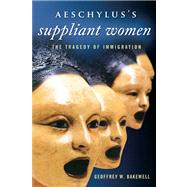Aeschylus's Suppliant Women
, by Bakewell, Geoffrey W.- ISBN: 9780299291747 | 029929174X
- Cover: Paperback
- Copyright: 8/16/2013
This book offers a provocative interpretation of a relatively neglected tragedy, Aeschylus's Suppliant Women. Although the play's subject is a venerable myth, it frames the flight of the daughters of Danaus from Egypt to Greece in starkly contemporary terms, emphasizing the encounter between newcomers and natives. Although some scholars read Suppliant Womenas modeling successful social integration, Geoffrey W. Bakewell argues that the play demonstrates, above all, the difficulties and dangers noncitizens brought to the polis. Rigorously historical, Bakewell situates Suppliant Womenin light of the unprecedented immigration that Athens experienced in the sixth and fifth centuries BCE. The flow of foreigners to Attika increased under the Pisistratids but became a flood following liberation, Cleisthenes, and the Persian Wars. As Athenians of the classical era became increasingly aware of their own collective identity, they sought to define themselves and exclude others. They created a formal legal status to designate the free noncitizens living among them, calling them meticsand calling their status metoikia.When Aeschylus dramatized the mythical flight of the Danaids from Egypt in his play Suppliant Women, he did so in light of his own time and place. Throughout the play, directly and indirectly, he casts the newcomers as meticsand their stay in Greece as metoikia. Bakewell maps the manifold anxieties that meticscreated in classical Athens, showing that although citizens benefited from the many immigrants in their midst, they also feared the effects of immigration in political, sexual, and economic realms. Bakewell finds metoikiawas a deeply flawed solution to the problem of large-scale immigration. Aeschylus's Argives accepted the Danaids as meticsonly under duress and as a temporary response to a crisis. Like the historical Athenians, they opted for metoikiabecause they lacked better alternatives.






